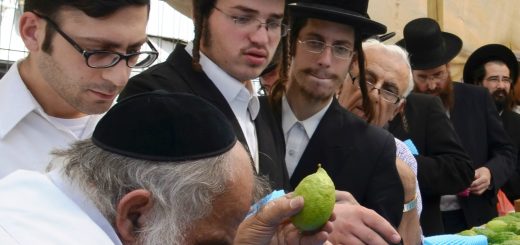To Each Person a Mission

Rav Dessler, following the Vilna Gaon, learns the opening words of ya’aleh ve’yavo as descriptive of a process of ascent that brings our neshama ever closer to HaKadosh Baruch Hu. The seven terms of ascent – ve’yipakeid v’yizacheir are considered one term — parallel the seven heavens that divide us from HaKadosh Baruch Hu.
According to this scheme, the terms ve’yipakeid v’yizacheir, correspond to the highest degree of closeness to Hashem, when our neshamah stands in His immediate presence. And what precisely is the zichroneinu u’fikdoneinu that we call upon Hashem to remember at that moment of greatest intimacy?
Remembrance, when used in reference to Hashem, refers to His focus on the essence of the thing, on its name at the moment of Creation (Ramban to Bereishis 8:1; Maharal, Gevuros Hashem chap. 64). What we call upon Hashem to remember at that moment of greatest intimacy is the unique mission with which He charged us at the moment of our Creation.
Each of us has some mission in life that is ours and ours alone. No two human beings are born with the same talents or the same challenges; no two are born into the same familial situation or the identical time and place in human history. These unique aspects of each of us constitute the raw material within which our mission in life will unfold.
Targum Onekolos translates the words “a living being” in the verse “. . . and [Hashem] blew into his nostrils the breath of life, and man became a living being, as “l’ruach m’mal’la” – a speaking being. The ability to speak is thus intimately connected with the Divine soul that Hashem breathed into Adam HaRishon. Each of us was brought into the world to “speak,” to proclaim some aspect of Hashem that no one else could. That proclamation is our mission in life.
IN THE ZICHRONUS SECTION of the Rosh Hashanah davening a similar idea appears. The prayer describes how “the remembrance of everything fashioned comes before You: everyone’s deed and mission (ma’aseh ish u’pikudaso).
The root פ-ק-ד when used as a verb denotes an act of remembrance or recall. With respect to Hashem, there is no remembrance or recall in the same sense as with human beings, since Hashem is incapable of forgetting. Rather it means that Hashem focuses His attention, as it were, on some event or state that from a human perspective is in the past.
The same three-letter root in its noun form refers to a mission (pekuda) or task (tafkid). Thus Hashem’s recall or remembrance, as on Rosh Hashanah, is connected to our unique mission in life.
Rabbi Shraga Feivel Mendlowitz used to stress that there are two aspects to Hashem’s remembrance on Rosh Hashanah – the first is a person’s deeds, which refers to his or her mitzvah observance (ma’aseh ish), and the second to the fulfillment of his or her unique mission in life (u’pikudaso). We might think that the former is the most important aspect of our judgment on Rosh Hashanah. But, Reb Shraga Feivel taught, that is not the case. The way that we fulfill our mission is often most determinative of our judgment on Rosh Hashanah.
HASHEM’S REMEMBRANCE OR RECALL is most often associated with His mercy. Both the Torah and Haftorah readings of the first day of Rosh Hashanah use terms of Divine remembrance in connection with Hashem answering the prayers of barren women. “Ve’Hashem pakad es Sarah — And Hashem remembered Sarah;” “Va’yizkareha Hashem – Hashem remembered her [i.e., Channah].”
We beseech Hashem on Rosh Hashanah to remember the Akeidah and the ashes of Yitzchak Avinu. And it is clear enough how the remembrance of the Akeidah would arouse Hashem’s mercy towards their descendants. But we also invoke Hashem’s remembrance of our unique mission. What is there about that that unique mission that should arouse Divine mercy?
I would suggest that the remembrance that we were created with a specific mission serves, as it were, to “remind” Hashem of all the high hopes he invested in us at the moment of our Creation, when He implanted within is our Divine soul. Perhaps too it serves to remind Hashem that He, k’v’yachol, needs us, and that the purpose of Creation – the Revelation of Hashem – depends in some measure upon every single one of us.
Neither Hashem’s high hopes for us, or even His “need” for us, contradicts the possibility of profound disappointment on His part at how far we have fallen short of fulfilling our assignment. Yet knowledge that each of us has been given such an assignment, and that we have a role to play in the Divine symphony should fill us with optimism.
That optimism is part of the elevation we feel in the period leading up to Rosh Hashanah. From Tisha B’Av until Rosh Hashanah, we read the seven haftoros of consolation from the prophet Yeshaya. Coming after the utter destruction of Tisha B’Av, the words of Yeshaya hold out the possibility of rectification and forgiveness.
The possibility of forgiveness is no guarantee. And so the hope we feel as Rosh Hashanah approaches is tempered by our fear. Indeed our optimism is the cause of our fear: “For with You is [the power of ] forgiveness, in order that you should be feared.” Without the possibility of forgiveness, there is no reason to fear. If we have lost the possibility of forgiveness, there is no further reason to guard our actions, since, in any event, complete destruction awaits us.
Our hopes for Rosh Hashanah are intimately bound to our unique mission in life since remembrance of that mission has the capacity to arouse Hashem’s mercy. But only if we do our part and attach ourselves to that mission.
That means reflecting deeply about everything that makes us unique in order that we discover our individual goal in life. It requires knowing our weaknesses, but, even more importantly, according to Rav Yisrael Salanter, knowing our strengths, since those strengths are the primary material which we possess to execute our mission. And it means asking what our fellow Jews and/or the larger society are lacking, and which of those things that are lacking we have the ability to provide.
In order that the remembrance of our Divine mission pass favorably before Him, it must first fully engage us, as we prepare for the Yom HaDin.
Ksiva ve’chasima tova
This article was published in the Mishpacha on September 11, 2007.




IMHO, RYBS ZTL’s most memorable Agadah section in a Yartzeit shiur, i believe around 1964, was on the topic above of each person’s shilchut and unique role.
Rabbi Rosenburg, that was a beautiful and inspiring piece.
Tzadok HaCohen of Lublin ztz”l writes in Poked Akarim that Hashem’s remembrance of Sarah was the first instance of such a thing happening since the Creation. That is the significance of פ-ק-ד; it’s an initialization. Prior to this, an akarah, a barren woman, was an akarah forever. Once Yitzhak was conceived, it no longer required a miraculous change in Nature for an akarah to conceive; similarly for the various miracles that happened for our ancestors. If I recall correctly, he implies that now, for us to receive the same miracle (only!) requires ז-כ-ר –a recollection of a process that has already been initialized.
This understanding of פ-ק-ד vs ז-כ-ר seems to fit with the idea from Rav Dessler that our individual tafkid is unique. And it would also imply that for us to merit Hashem’s remembrance, we need to desire to fulfill our individual tafkid with the same intensity that Sarah desired a child.
May it be so for all of us.
Ksiva ve’chasima tova
You might want to forward this to secular friends and relatives for kiruv. It’s very easy for secular Jews to think that Judaism is predominately a set of laws and restrictions.
Yishar Koach.
Far be it from me to try to dispute the Vilna Gaon, but I do not understand one facet of what you cited in his name (via Rav Dessler).
Yaaleh veYavo is said on occasions where Hashem helps us in ways that go beyond the natural order. Therefore, wouldn’t it make sense for it to be composed with eight terms of ascent, going beyond the world created in seven days? What would be the motivation for folding “veyipaqeid veyizakheir” into one, and reducing the count to seven?